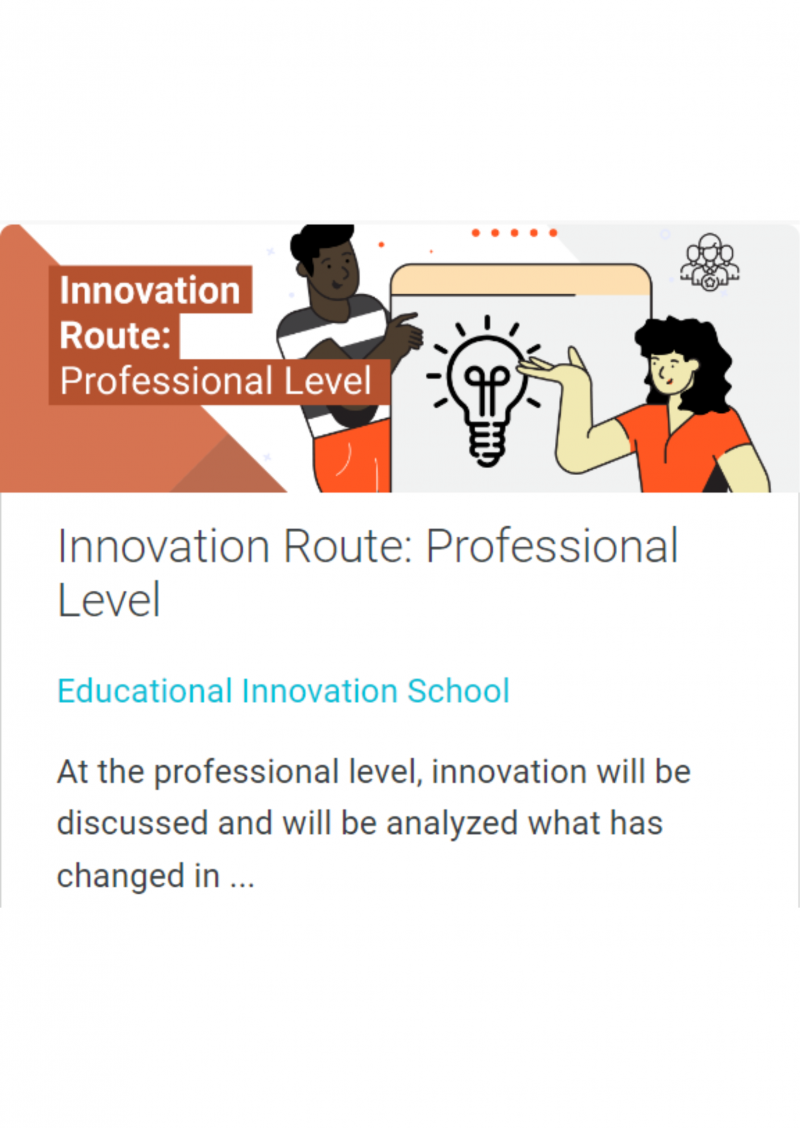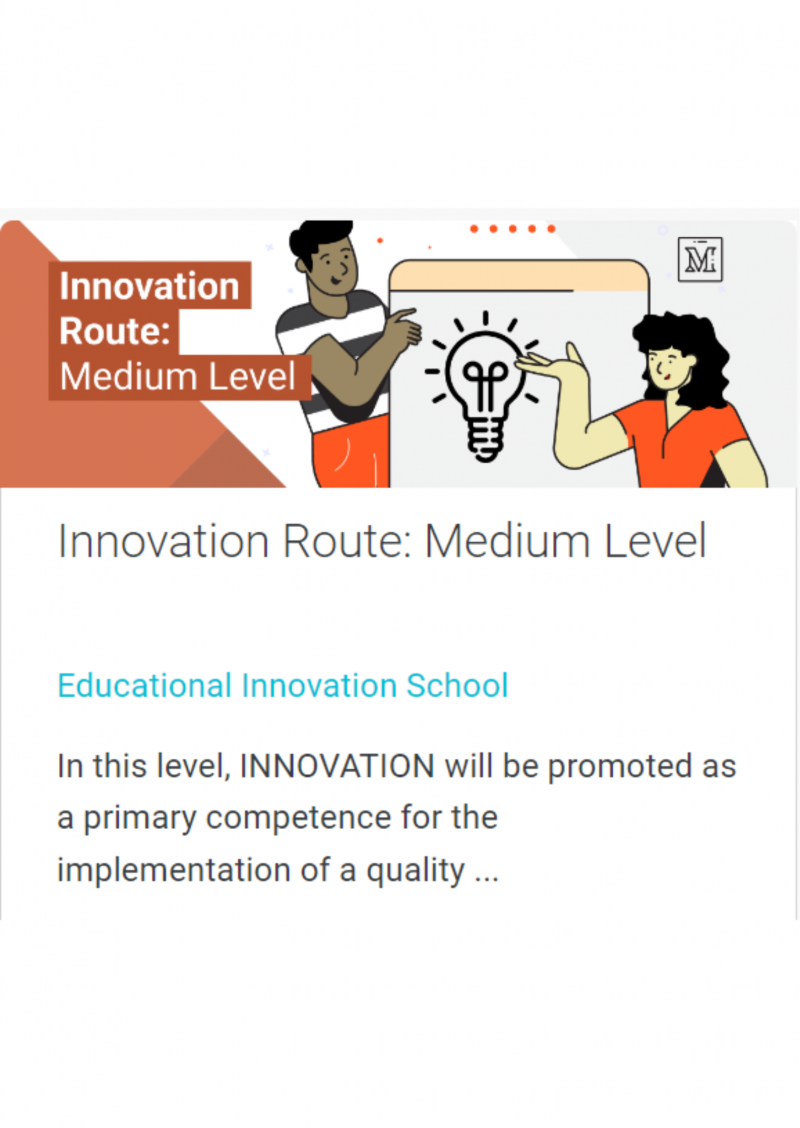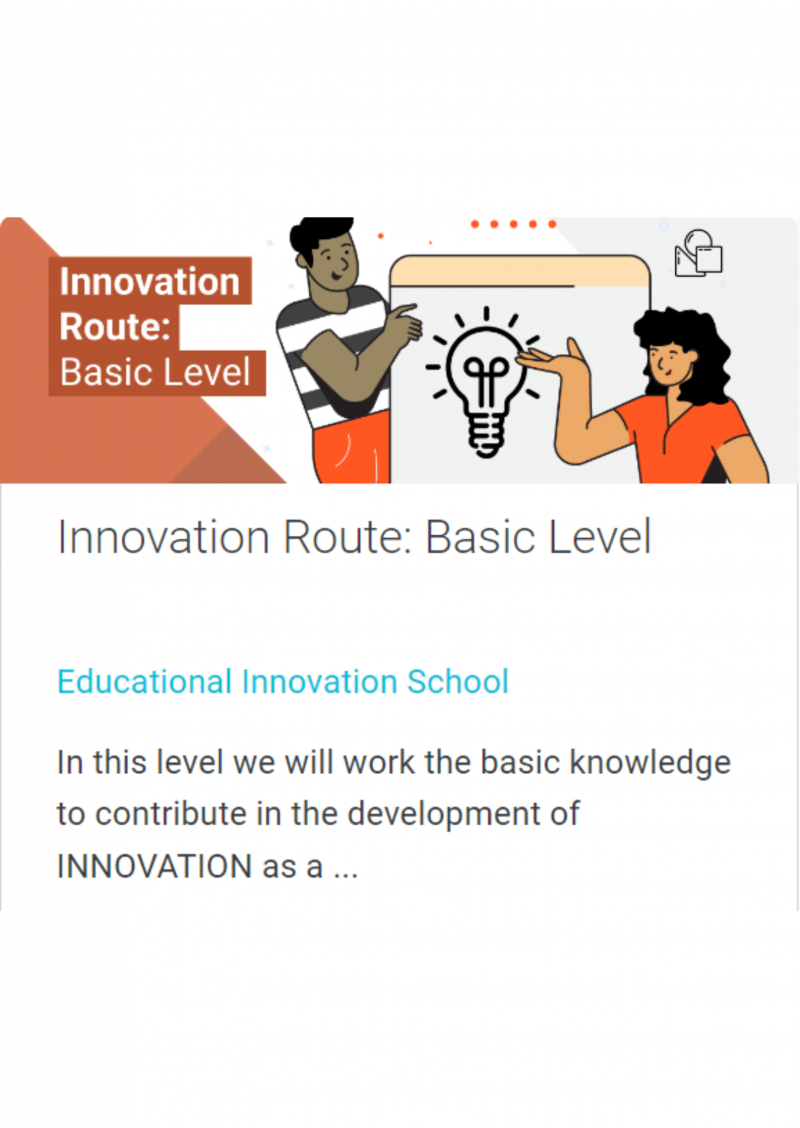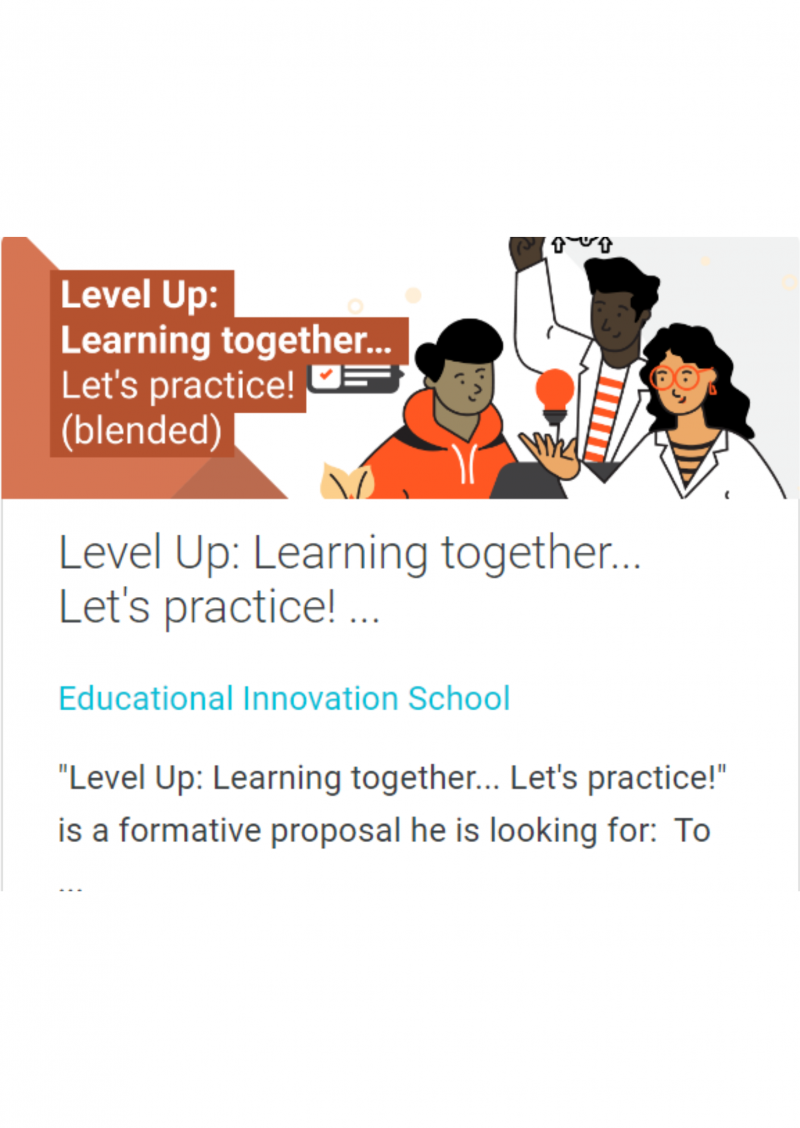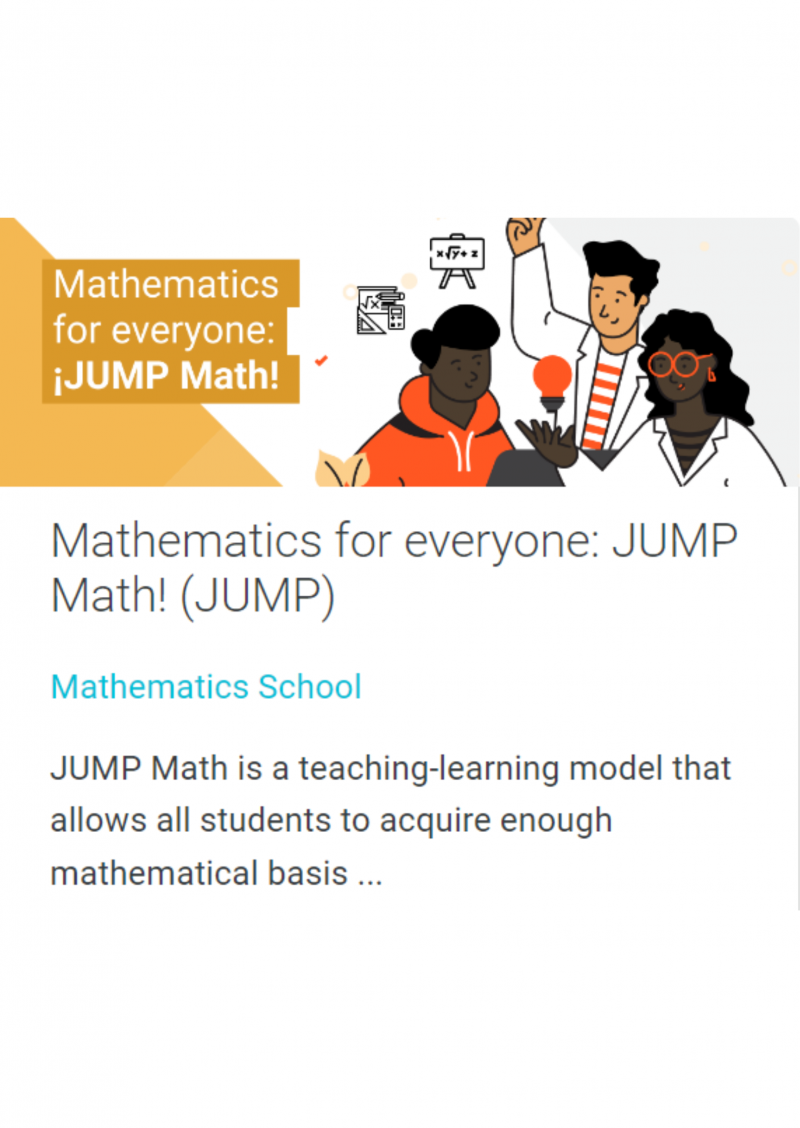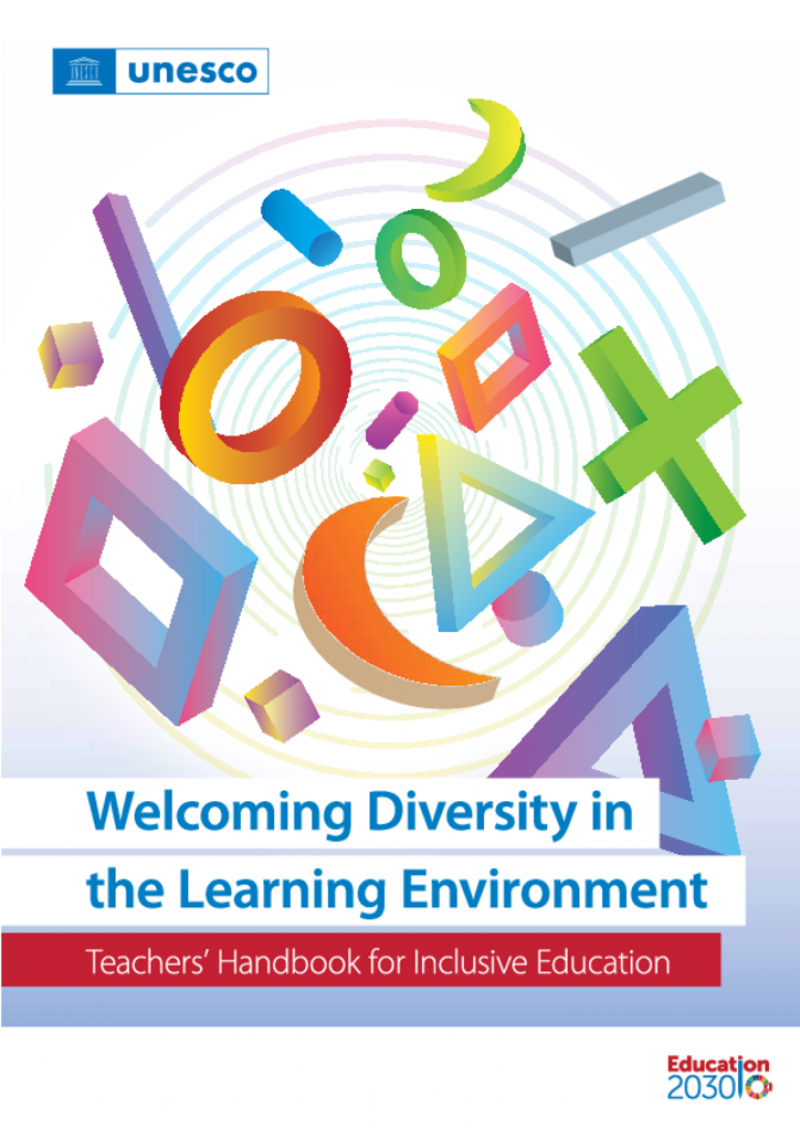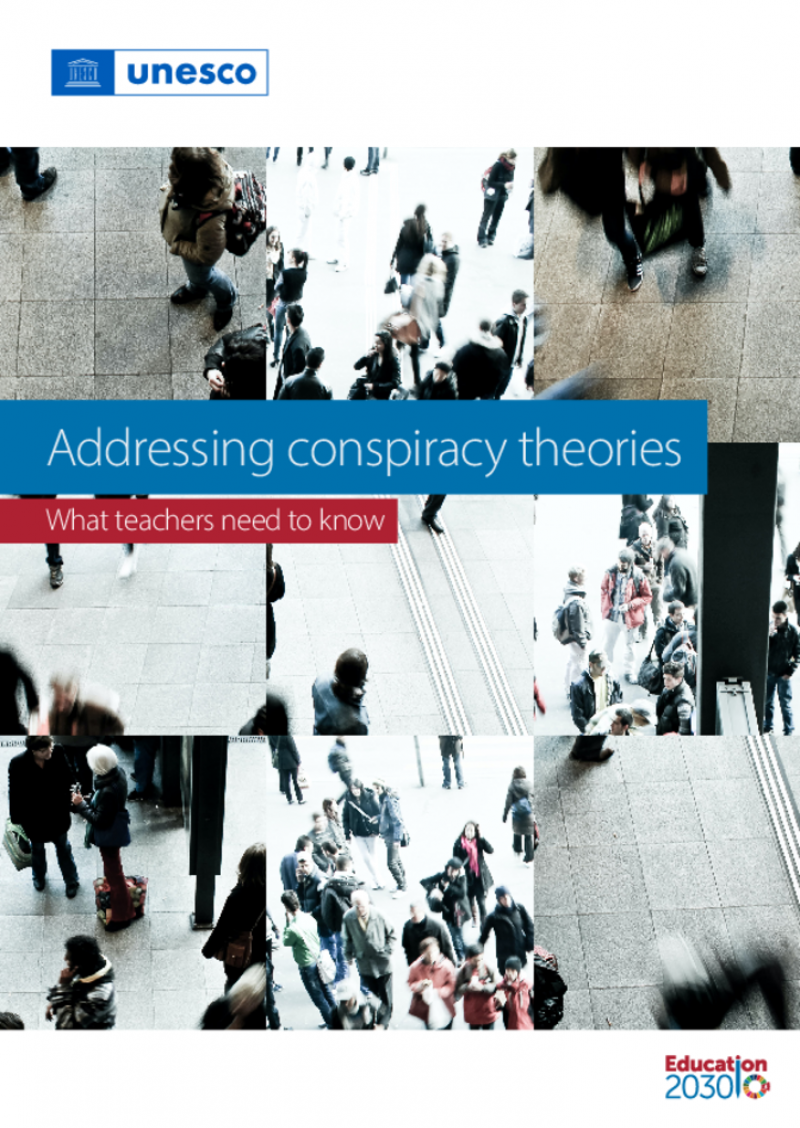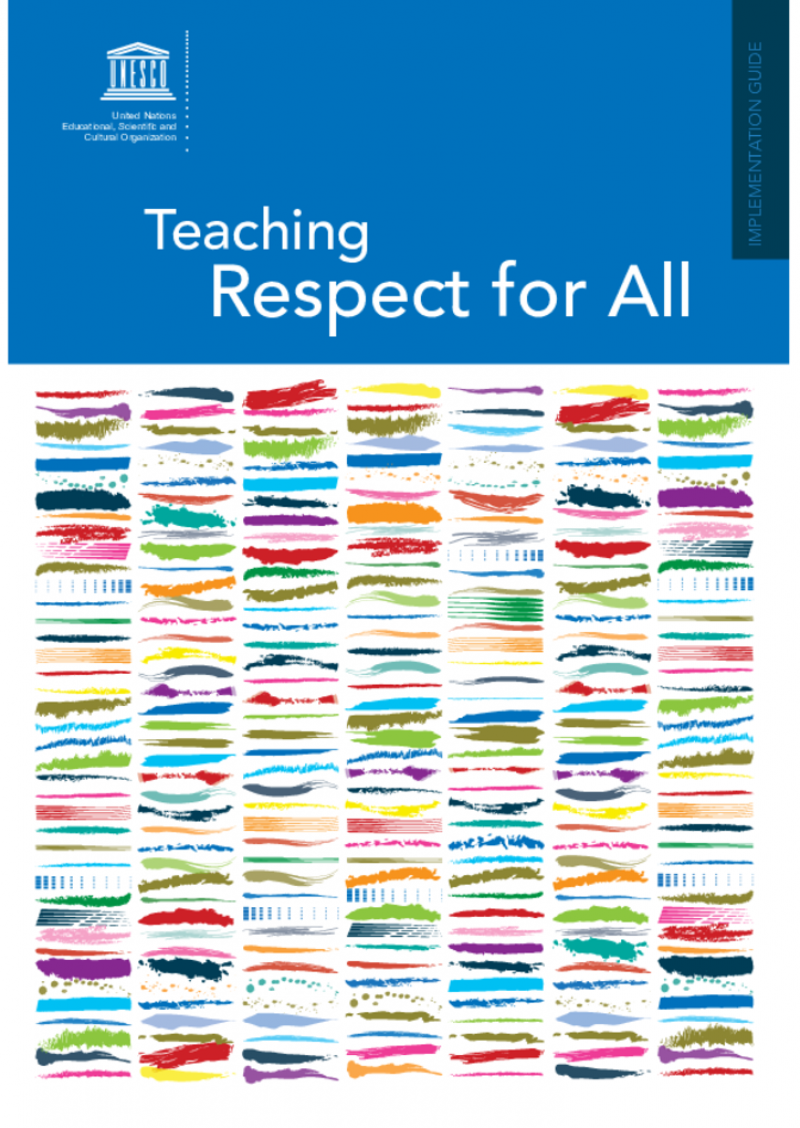Centre de Ressources pour les Enseignants
Affichage de 41 à 60 sur 77
Route de l'innovation: Niveau professionnel
Le niveau professionnel traitera de l’innovation et analysera ce qui a changé dans les méthodologies pédagogiques. Des cas de réussite et des suggestions d’application de ces méthodologies seront également évoqués afin de faciliter l’identification des points à améliorer, des besoins et des problèmes en classe.
L'inscription (gratuite) sur la plateforme de ProFuturo est nécessaire pour accéder au cours.
Route de l'innovation: Niveau avancé
Cette proposition se centre sur le travail de l’innovation en tant que compétence pour la transformation du système éducatif. Il s’agit de mettre en pratique l'innovation en développant de manière créative des applications technologiques.
L'inscription (gratuite) sur la plateforme de ProFuturo est nécessaire pour accéder au cours.
Route de l'innovation: Niveau intermédiaire
Cette proposition de développement professionnel mettra en avant l'innovation comme compétence primordiale pour la mise en place d’un modèle d’enseignement-apprentissage de qualité. À ce niveau, l’enseignant connaîtra des expériences éducatives innovantes qu’il pourra mettre en pratique dans son centre éducatif.
L'inscription (gratuite) sur la plateforme de ProFuturo est nécessaire pour accéder au cours.
Route de l'innovation: Niveau de base
L'objectif de cette proposition de développement professionnel des enseignants est de réfléchir à l'importance de l'innovation et de la créativité en classe et de créer les bases du développement de pratiques visant à la favoriser. Ce niveau se focalise sur le travail des connaissances de base pour contribuer au développement de l'innovation en tant que compétence fondamentale favorisant le succès personnel et professionnel des élèves.
L'inscription (gratuite) sur la plateforme de ProFuturo est nécessaire pour accéder au cours.
Level Up: Apprenons ensemble... Entraînons-nous!
Il s'agit d'une formation qui offre une série d'outils innovants et cherche à favoriser la collaboration entre enseignants.
L'inscription (gratuite) sur la plateforme de ProFuturo est nécessaire pour accéder au cours.
JUMP Math! Les mathématiques à la portée de tous
L’objectif de cette formation est d’améliorer la capacité pédagogique des enseignants du primaire dans le domaine mathématique en s’inspirant de la philosophie et de la méthodologie de JUMP Math : un modèle d’enseignement-apprentissage qui permet à tous les élèves d’acquérir une base mathématique suffisante pour répondre en toute confiance à des défis vitaux et professionnels.
L'inscription (gratuite) sur la plateforme de ProFuturo est nécessaire pour accéder au cours.
Coordinated action to transform education. What's in it for teacher representatives?
This briefs presents what teacher representatives gain through coordinated action. The involvement of teacher representative bodies in broader policy dialogue takes place through multi-stakeholder coordination mechanisms, including local education groups (or the equivalent). Here, they can bring the attention of decision makers and other partners to issues and practices for ensuring coherence in the implementation of education policy, including investments needed in teacher preparation, professional development, raising teaching standards and improving teacher well-being.
Welcoming diversity in the learning environment: teachers' handbook for inclusive education
This teachers' handbook is intended to serve as a practical resource to help teachers and teacher educators to gain understanding of the multiple issues of inclusion in their day-to-day work and acquire competencies that facilitate inclusive pedagogy. The handbook is comprised of nine modules – each of which presents the conceptual discussion of key topics related to inclusion and diversity and features some promising case studies, instruments and approaches. It also provides a framework for ensuring learning continuity in the wake of crises and emergencies such as the COVID-19 pandemic, and deals with a range of topics aimed at building the capacities of teachers and teacher educators for recovery and resilience in education systems in the COVID-19 context.
How to design an electronic lesson in 24 hours
Learning design for smart learning.
Defines the general landscape of instructional design in smart education.
Understand the five steps of lesson planning in Smart Learning.
Explains the requirements for designing a session in smart learning.
Design a smart learning session using Google Classroom.
How to become a remote teacher in 24 hours
Recognize e-learning technology.
Identify the main components of e-learning.
Identify tools for managing the educational process in e-learning.
Uses the tools of the educational process: Moodle Cloud.
Social and emotional learning for schools
This is a dual certifying course that combines social and emotional learning (SEL) for classrooms and SEL for teachers. The objective of the certification is to enhance personal well-being and build the professional capacity of teachers for SEL.
Online Learning Design for Educators Specialization
Specialization offering three courses for educators seeking to improve and expand their repertoire of online teaching skills related to the design, development and delivery of effective and engaging online courses and lessons for school age and adult learners. It includes three courses: "Online education: The foundations of online teaching", "Create video, audio and infographics for online learning", "Online teaching: Using Zoom to connect with learners". It is possible to audit the courses for free.
Addressing anti-semitism in schools: training curriculum for secondary education teachers
This publication is part of a four-volume set of training curricula to address anti-Semitism in schools. This volume focuses on the training curriculum for secondary education teachers. Each volume in this set aims to assist trainers in the field of education globally to work effectively towards strengthening the capacity of teachers to prevent and respond to antiSemitism, this specific and highly dangerous type of prejudice directed at Jewish people. In this sense, the curriculum addresses anti-Semitic prejudice and perceptions of Jews, phenomena which often also fulfil a social and political function in societies around the world; it is not material aimed at preparing teachers for intercultural dialogue.
Addressing anti-semitism in schools: training curriculum for vocational education teachers
This publication is part of a four-volume set of training curricula to address anti-Semitism in schools. This volume focuses on the training curriculum for vocational education teachers. Each volume in this set aims to assist trainers in the field of education globally to work effectively towards strengthening the capacity of teachers to prevent and respond to antiSemitism, this specific and highly dangerous type of prejudice directed at Jewish people. In this sense, the curriculum addresses anti-Semitic prejudice and perceptions of Jews, phenomena which often also fulfil a social and political function in societies around the world; it is not material aimed at preparing teachers for intercultural dialogue.
Addressing anti-semitism in schools: training curriculum for school directors
This publication is part of a four-volume set of training curricula to address anti-Semitism in schools. This volume focuses on the training curriculum for school directors. Each volume in this set aims to assist trainers in the field of education globally to work effectively towards strengthening the capacity of teachers to prevent and respond to antiSemitism, this specific and highly dangerous type of prejudice directed at Jewish people. In this sense, the curriculum addresses anti-Semitic prejudice and perceptions of Jews, phenomena which often also fulfil a social and political function in societies around the world; it is not material aimed at preparing teachers for intercultural dialogue.
Addressing anti-semitism in schools: training curriculum for primary education teachers
This publication is part of a four-volume set of training curricula to address anti-Semitism in schools. This volume focuses on the training curriculum for primary education teachers. Each volume in this set aims to assist trainers in the field of education globally to work effectively towards strengthening the capacity of teachers to prevent and respond to antiSemitism, this specific and highly dangerous type of prejudice directed at Jewish people. In this sense, the curriculum addresses anti-Semitic prejudice and perceptions of Jews, phenomena which often also fulfil a social and political function in societies around the world; it is not material aimed at preparing teachers for intercultural dialogue.
Addressing conspiracy theories: what teachers need to know
This document intends to support educators limit the dissemination of conspiracy theories by responding to them when they are shared among learners or within the wider school community.
Teaching respect for all: implementation guide
This Teaching Respect for All Implementation Guide comprises a set of policy guidelines, questions for self-reflection, ideas and examples of learning activities to integrate Teaching Respect for All into all aspects of upper primary and lower secondary education, in an effort to counteract discrimination in and through education. It mainly targets policy makers, administrators/headteachers and formal and informal educators.
Part 2 targets headteachers and education NGO managers, suggesting key areas of intervention with a list of possible actions/activities and Part 3 targets teachers and describes methods of dealing with difficult topics such as racism and discrimination with learners as well as provides suggestions for possible entry points and topics to link the issues of respect for all with particular teaching subjects.
Permettre aux élèves d’oeuvrer pour des sociétés justes: manuel pour le personnel enseignant du secondaire
Le présent manuel a pour objet de fournir au personnel enseignant une sélection de ressources éducatives pertinentes et accessibles à utiliser dans la salle de classe et en dehors de la classe (résumés d'activités de courte durée, de cours et d'unités) pour enseigner les principes de l'état de droit aux élèves du secondaire.
Il peut aussi être utilisé par le personnel qui exerce dans des cadres éducatifs non formels ou auprès de jeunes, par exemple dans des associations sportives, des organisations communautaires, le secteur du travail social et le secteur de la justice.
Le manuel pour le primaire est disponible ici.
Permettre aux élèves d’œuvrer pour des sociétés justes: manuel pour le personnel enseignant du primaire
Le présent manuel a pour objet de fournir au personnel enseignant une sélection de ressources éducatives pertinentes et accessibles à utiliser dans la salle de classe et en dehors de la classe (résumés d'activités de courte durée, de cours et d'unités) pour enseigner les principes de l'état de droit aux élèves du primaire.
Il peut aussi être utilisé par le personnel qui exerce dans des cadres éducatifs non formels ou auprès de jeunes, par exemple dans des associations sportives, des organisations communautaires, le secteur du travail social et le secteur de la justice.
Le manuel pour le secondaire est disponible ici.
